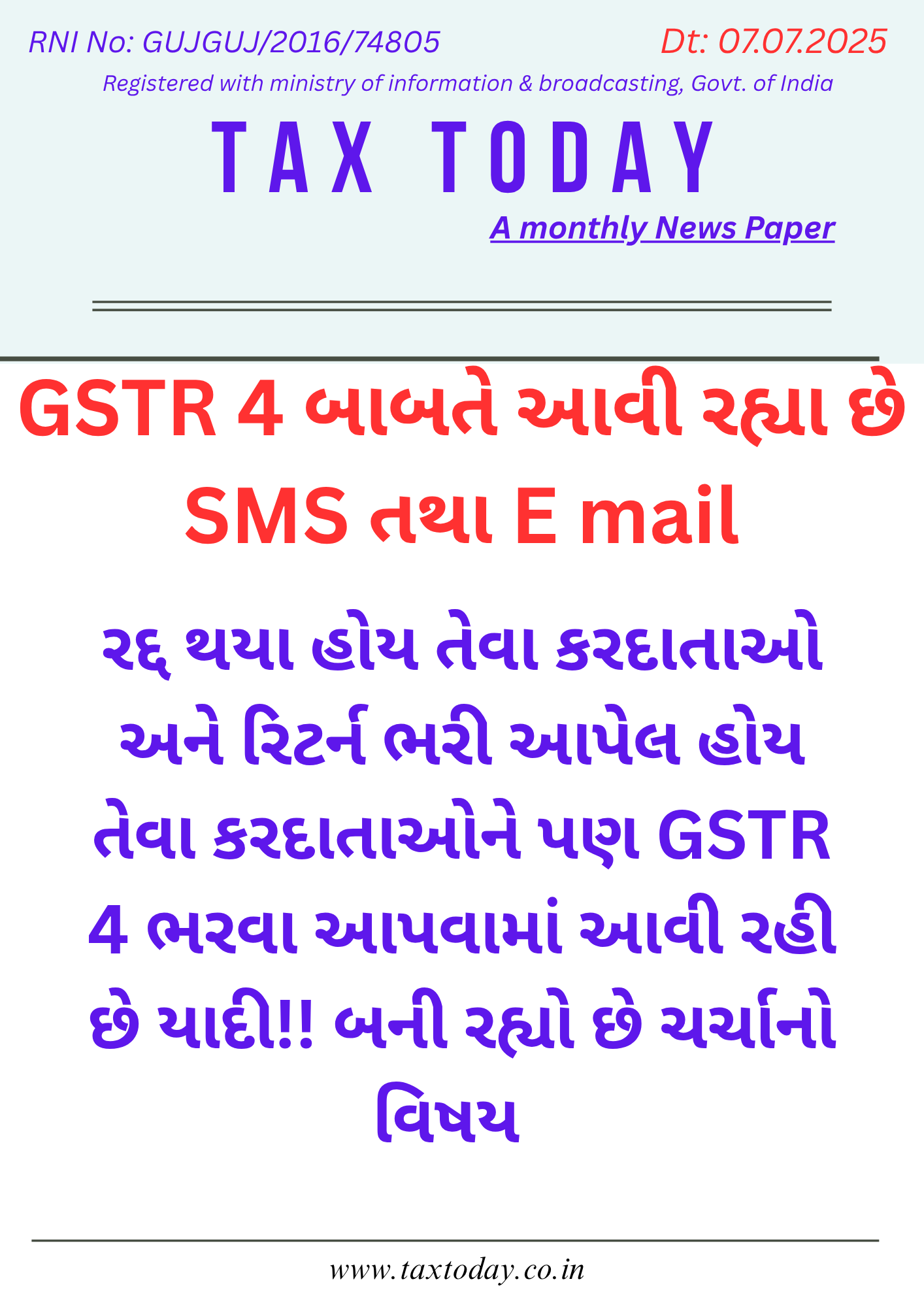GST WEEKLY UPDATE : 49/2023-24 (03.03.2024) By CA Vipul Khandhar

-By CA Vipul Khandhar
- Instances of Delay in registration reported by some Taxpayers despite successful Aadhar Authentication in accordance with Rule 8 and 9 CGST, Rules, 2017-reg:
In accordance with Rule 9 of the Central Goods and Services Tax (CGST) Rules, 2017, pertaining to the verification and approval of registration applications, following is informed:
Where a person has undergone Aadhaar authentication as per sub-rule (4A) of rule 8 but has been identified in terms of Rule 9(aa) by the common portal for detailed verification based on risk profile, your application for registration would be processed within thirty days of application submission.
Necessary changes would also be made to reflect the same in the online tracking module vis-à-vis processing of registration application.
2. Implementation of Electronic Cash Ledger (ECL) for payment of Import duties for goods imported through Courier Mode from today, i.e. March 01, 2024:
The Electronic Cash Ledger (ECL) shall be the mode of payment of Import duties for goods imported through International Courier terminals from March 01, 2024.
With the introduction of ECL, Express Industry can make payment through multiple banks as per convenience by internet banking and NEFT/RTGS from the existing one bank.
Earlier, the Electronic Cash Ledger was implemented for payment of Import Duties for cargo processed through EDI at Seaports, Airports, ICDs and LCSs from April 01, 2023.
For implementing the new payment system by use of ECL, handholding of the trade was done by means of registration mela and webinars conducted by DG Systems, CBIC, from October to December, 2023 to familiarise different stakeholders before the launch of ECL for Express Cargo Industry.
A pilot phase was started on January 15, 2024 and the same was expanded in phases to Delhi, Bengaluru, Mumbai and all other International Courier Terminal locations. Since February 12, 2024, the pilot has been running successfully in all the locations without any glitches in the system.
The new ECL mode of payment is now available for all EXIM and it would facilitate ease of doing business to the trade.
3. Electronic Bank Realisation Certificate(eBRC) for the merchandise exporter & service exporter compulsory to be generated from DGFT website for availing export exemption of GST & other export benefit.:
- “eBRC” stands for “electronic Bank Realisation Certificate”.
- eBRC serves as proof of realization against exports done
- Issued on DGFT platform by concerned banks at the request of exporter
Uses of eBRC:
To avail incentives under Foreign Trade Policy of DGFT
- Advance Authorisation scheme
- Export Promotion Capital Goods Scheme (EPCG)
- MEIS / SEIS / TMA (legacy schemes)
GST compliances (Rule 89(2) of the CGST Rules)
- Refund of unutilized input tax credit (ITC) on account of exports without payment of tax.
- Refund of tax paid on export of services with payment of tax
- Refund of unutilized ITC on account of supplies made to SEZ Unit/SEZ Developer without payment of tax
- Refund of tax paid on supplies made to SEZ Unit/SEZ Developer with payment of tax
- Refund to supplier of tax paid on deemed export supplies
- Refund to recipient of tax paid on deemed export supplies
Major Changes in the revamped eBRC system
- Based on trust in Indian exporters
- eBRC shall henceforth be generated by exporters themselves via self certification
- Cost free process on DGFT portal
- Need for application and request to banks for generation done away with
- Paperless process without the need for any paper submission to any authority at the time of generation
- A Risk Management based post audit mechanism for banks and other stakeholders to verify bonafides
- Each bank will decide own cut off date to move to self certification based eBRC generation
- IRMs received after cutoff date will be available to exporter for self certification based eBRC generation
- Bank cutoff date available on DGFT website
- Self certified eBRC generation will be based on system based checks as per Business rules
- Business rules available on DGFT website
- Trade Notice 33/2023-24 dated November 10, 2023 maybe referred for more details
Revamped process flow for eBRC generation
- DGFT already captures Exporter’s Bank account details and PAN under IEC issued
- All Inward Remittance Message(IRM) mapped with PAN to be pushed by the banks to DGFT using a API integration
- The given inward remittance details shall automatically appear in account of respective IEC holder
- Exporter may tag the inward remittance with the shipping bill/invoice to generate eBRCs directly.
- eBRCs so generated will flow to banks for post audit risk management as per banks’ own process
- eBRC also planned to be digitally shared with other agencies in future
Major Benefits of the revamped eBRC system
- Reduction in compliance costs for exporters
- Cost free generation – Cost burden reported especially by MSME exporters alleviated
- Paperless generation
- Opens new avenues for small exporters
- Especially useful for e-commerce exports with low cost, high volume of transactions to claim benefits and refunds
- Workload reduction for banks
- Scaling of system made possible in light of GoI’s target of 1 Trillion exports each for Merchandise and Services by 2030
- Banks will focus on targeted risks only instead of checking all transaction documents
- Aid targeted policy making
- Near real-time granular data on service exports at SAC code level will now be available
This data would allow for further automation at DGFT and other agencies and frame more targeted schemes and strategies for service exports.
- Rules and guidelines published on DGFT website
- DGFT website (www.dgft.gov.in) –> Services –> eBRC
So to get exemption from GST & benefit of export incentive self e-brc required to be generated.
- AAR & Important Judgements:
(i) Hon’ble Madras Highcourt Decision Regarding ITC can’t be rejected solely on ground that assessee had not claimed ITC in GSTR-3B:
(Applicant – Sri Shanmuga Hardwares Electricals)
When Assessee claims eligibility for Input Tax Credit (ITC) for assessment years 2017-2018, 2018-2019, and 2019-2020 which was duly reflected in GSTR 2A returns.- Assessee states that GSTR-9 (annual) returns were filed duly reflecting ITC claims of assessee – Said ITC claims were rejected on ground that assessee had not claimed ITC in GSTR 3B returns.
Held that, “When registered person asserts that he is eligible for ITC by referring to GSTR-2A and GSTR-9 returns, assessing officer should examine whether ITC claim is valid by examining all relevant documents, including by calling upon registered person to provide such documents.
(ii) Hon’ble Delhi Highcourt Decision Regarding mandatory automatic interest on delayed GST refunds, reinforcing taxpayers’ rights under Section 56:
(Applicant – Raghav Ventures)
Petitioner, an exporter of mobile phones and accessories, sought a direction for the grant of a total Integrated Goods and Services Tax (IGST) refund amounting to Rs. 2,44,75,410/- for the tax periods of December 2022, February 2023, March 2023, and May 2023, along with interest as per Section 56 of the DGST/CGST Act.
The Petitioner had been exporting goods and claiming refunds through shipping bills, which were processed by Customs through ICEGATE based on the exports made on various dates from December 2022 to May 2023.
Petitioner’s Argument:
The Petitioner argued that under Section 56 of the CGST/DGST Act, they were entitled to interest at the rate of 6% on the delayed refund from the date immediately after 60 days from the receipt of the refund application until the date of refund.
Judgment:
The High Court of Delhi ruled in favor of the Petitioner, stating that payment of interest under Section 56 is statutory and automatically payable if the refund is not made within 60 days from the receipt of the application.
The court directed the Respondent to process and credit the refund of interest at the rate of 6% from the date immediately after the expiry of sixty days from the date of receipt of refund applications until the date the refund was credited to the Petitioner’s account.
The Madras High Court, in a landmark judgment in case of Sri Shanmuga Hardwares Electricals vs The State Tax Officer (WP Nos. 3804, 3808 & 3813 of 2024 and W.M.P.Nos. 4105, 4107, 4110, 4111, 4116 & 4119 of 2024) dt-20.02.2024, ruled that ITC claims should not be rejected solely due to their absence in GSTR-3B, mandating a comprehensive review of GSTR-2A and GSTR-9 for a thorough assessment.
Disclaimer:
This publication contains information for general guidance only. It is not intended to address the circumstances of any particular individual or entity. Although the best of endeavour has been made to provide the provisions in a simpler and accurate form, there is no substitute to detailed research with regard to the specific situation of a particular individual or entity. We do not accept any responsibility for loss incurred by any person for acting or refraining to act as a result of any matter in this publication.
(The author is a well known Chartered Accountant practicing at Ahmedabad)





